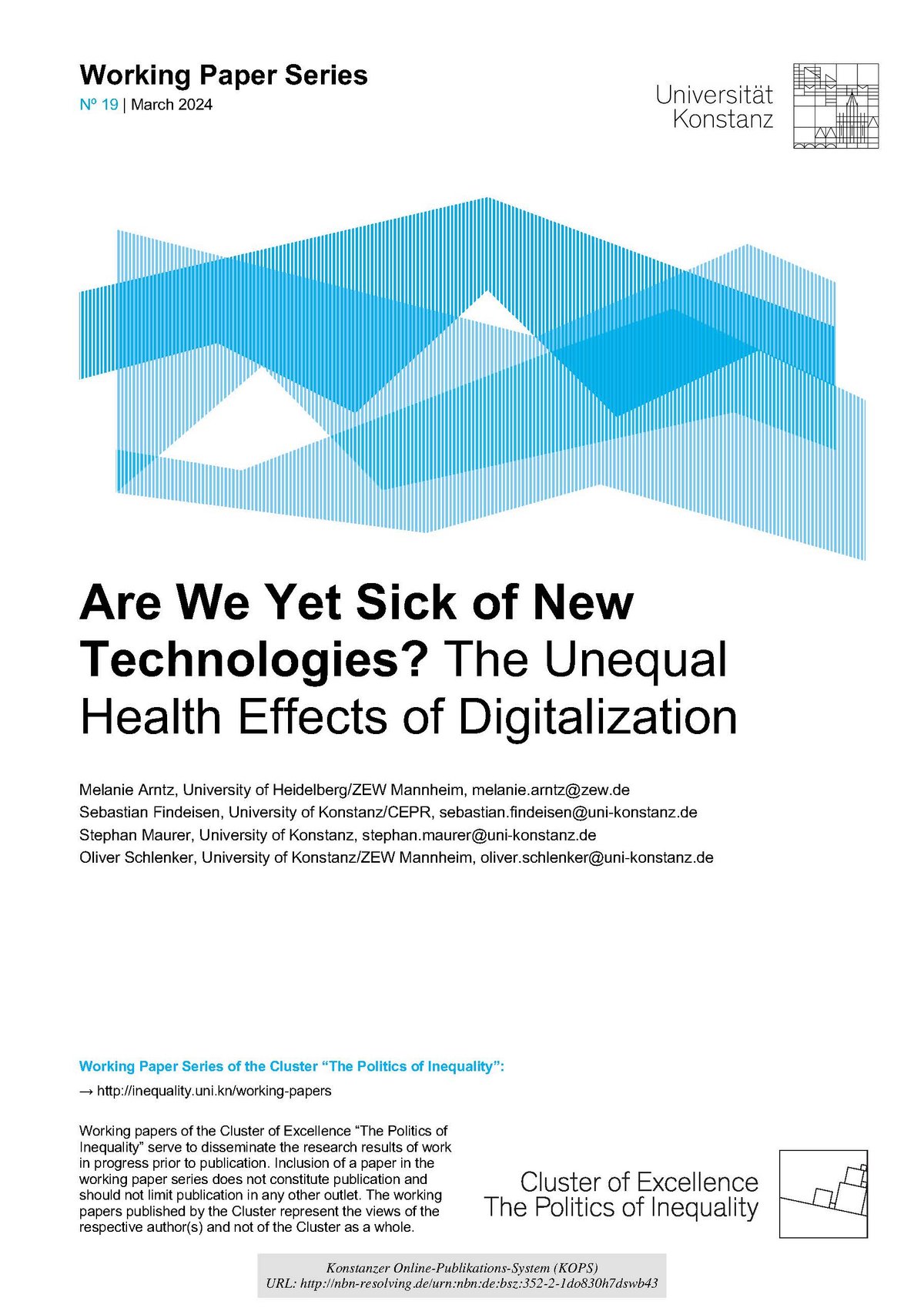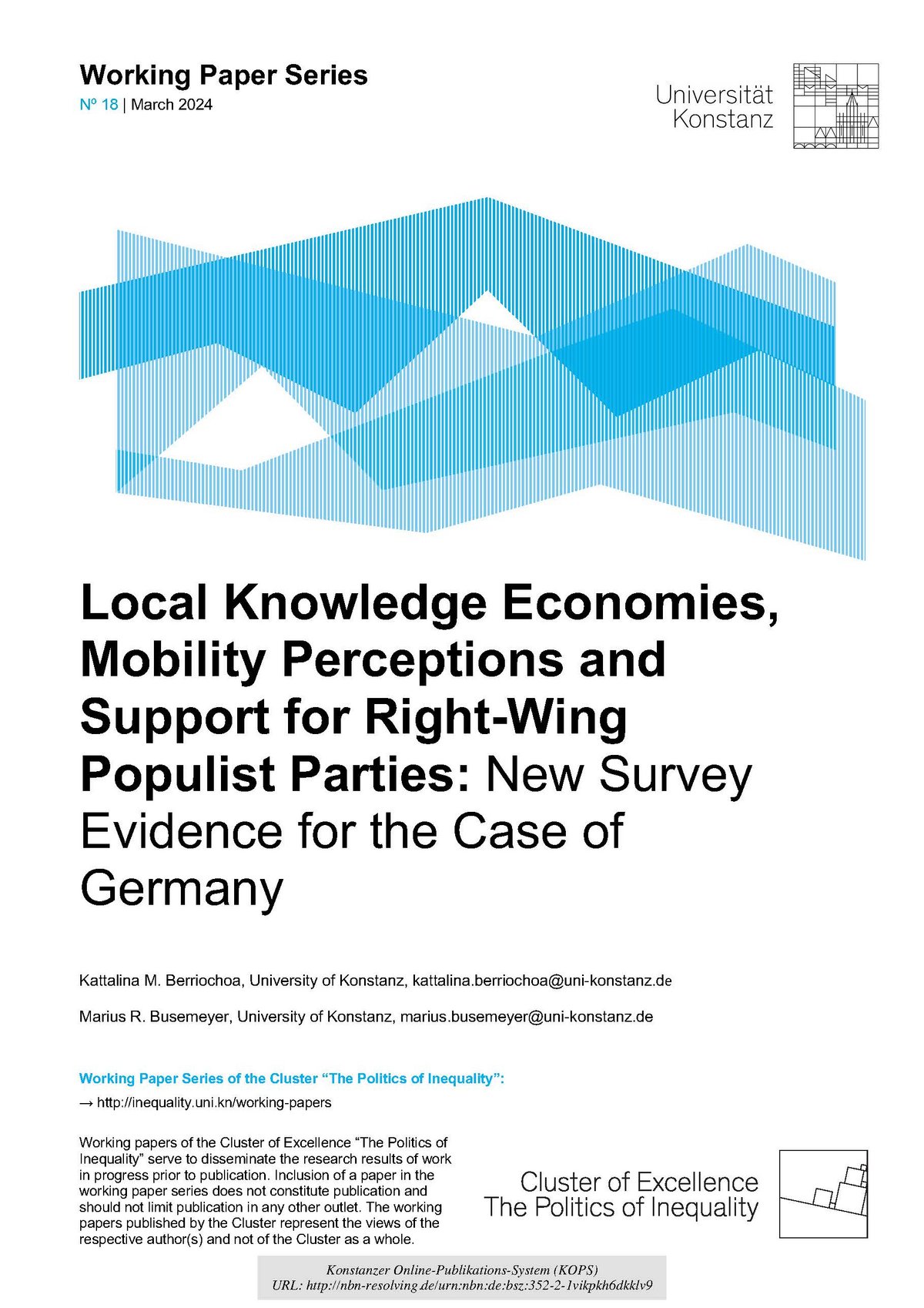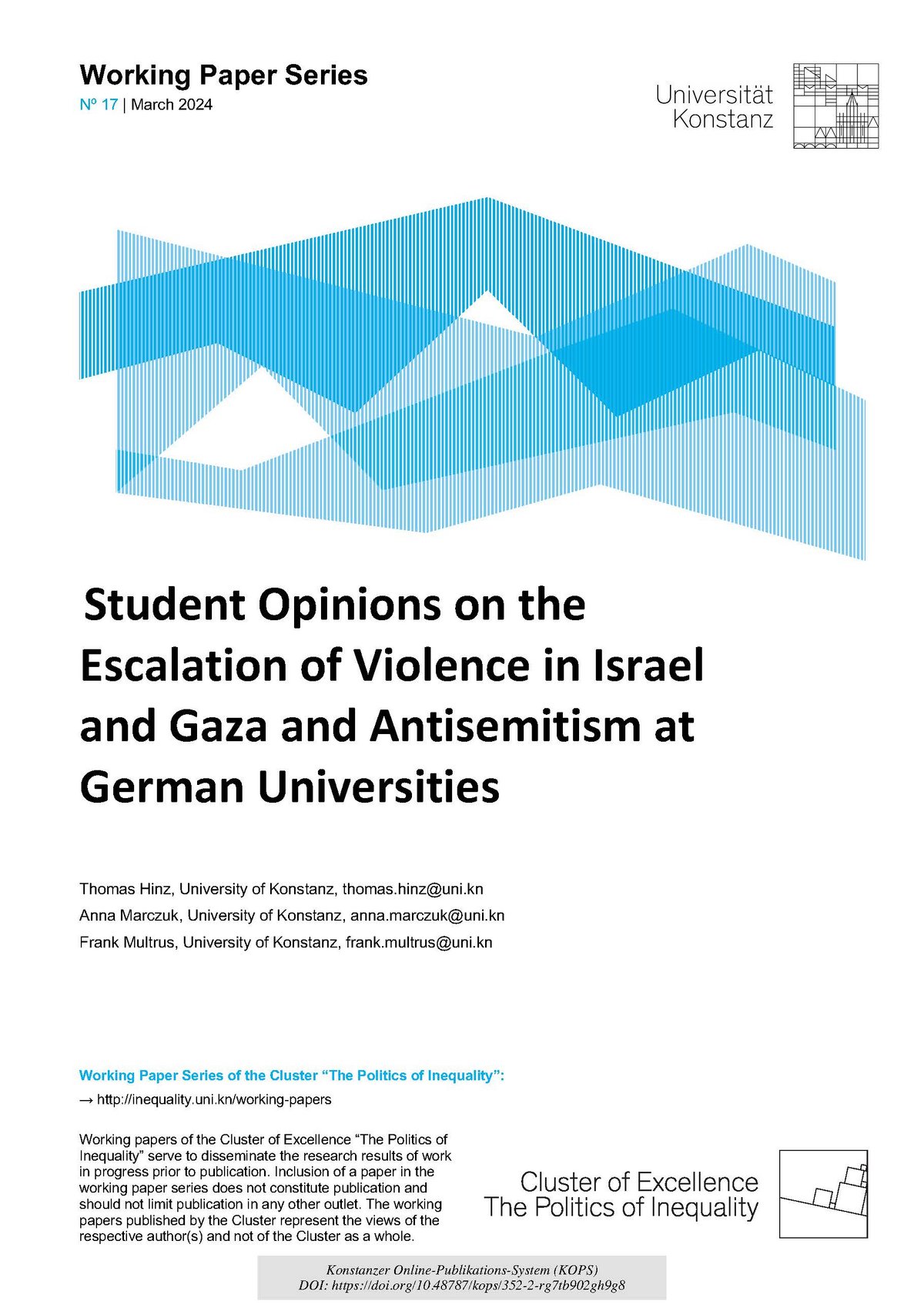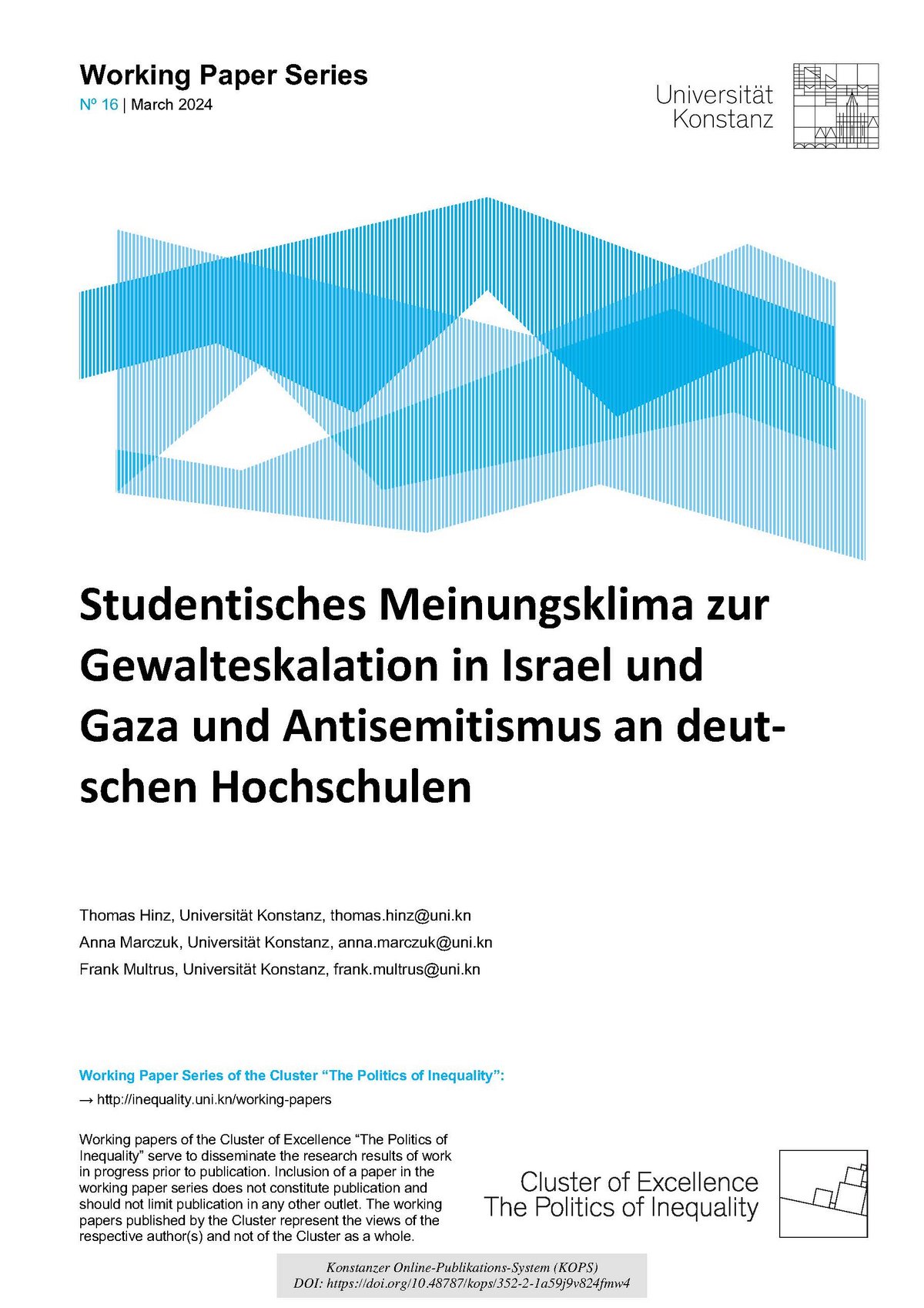Cluster-Veröffentlichungen: Working Papers
Die 'The Politics of Inequality' Working Papers dienen zur Weitergabe von Forschungsergebnissen aus der laufenden Arbeit vor der eigentlichen Veröffentlichung. Aufnahme eines Papiers in die Working Paper-Reihe ist nicht gleichbedeutend mit einer Veröffentlichung und sollte für die Veröffentlichung in einem anderen Organ keinen Hinderungsgrund darstellen. Die Working Papers, die vom Cluster herausgebracht werden, repräsentieren die Ansichten der betreffenden Autorschaft, nicht des Clusters als Ganzem.

Working Paper Series Nº 25 | July 2024
Sebastian Findeisen; Wolfgang Dauth; Oliver Schlenker (2024): Organized Labor Versus Robots? Evidence from Micro Data
Abstract:
New technologies drive productivity growth but the distribution of gains might be unequal and is mediated by labor market institutions. We study the role that organized labor plays in shielding incumbent workers from the potential negative consequences of automation. Combining German individual-level administrative records with information on plant-level robot adoption and the presence of works councils, a form of shop-floor worker representation, we find positive moderating effects of works councils on retention for incumbent workers during automation events. Separations for workers with replaceable task profiles are significantly reduced. When labor markets are tight and replacement costs are high for firms, incumbent workers become more valuable and the effects of works councils during automation events start to disappear. Older workers, who find it more challenging to reallocate to new employers, benefit the most from organized labor in terms of wages employment. Concerning mechanisms we find that robot-adopting plants with works councils employ not more but higher quality robots. They also provide more training during robot adoption and have higher productivity growth thereafter.

Working Paper Series Nº 24 | July 2024
Friedrich Breyer; Maj-Britt Sterba (2024): Are Taxes or User-Fees more Popular among Politicians? The Case of Childcare
Abstract:
How shall publicly provided excludable goods be financed – by general taxation or user fees? Prominent applications are in education, notably universities and early childcare. The general conclusion of the existing literature is that exclusive tax financing is neither efficient nor desirable under widely shared distributive goals. A striking example is childcare because here fees are often made dependent on parents’ i ncome. Given the rather clear arguments in favor of user fees for formal childcare, it is surprising to notice that some German states with leftist governments have abolished user fees and replaced them with pure tax financing. It is the purpose of this research to investigate the attitudes of politicians towards user fees for publicly funded childcare and to explore the justifications given for these attitudes. This was done within face-to-face online interviews with an embedded survey with members of eight federal state legislatures. The survey results confirm the experience of real political decisions in that left-leaning politicians tend to oppose parental fees. They do so mainly with the justification that “education must be free for all”. Right-leaning politicians tend to support fees and consider an abolition as helping mainly the rich and a problem for the quality of childcare. We discuss how these results can be reconciled with the redistributive goals of leftist parties.

Working Paper Series Nº 23 | June 2024
Friedrich Breyer; Christian Breunig; Mark Kapteina; Guido Schwerdt; Maj-Britt Sterba (2024): Between Beveridge and Bismarck: Preferences for Redistribution through Public Pensions
Abstract:
Citizens and politicians rely on their knowledge of a pension system, particularly its redistributive features, when forming their preferences and evaluating its fairness. Taking advantage of the Bismarckian rule of proportionality in Germany, we provide experimental and survey-based evidence indicating that voters and politicians adjust their preferences and perceptions of fairness when new information becomes available. Information on the proportional character of the pension system increases perceived fairness and decreases redistributive demands, whereas information about inequalities in life expectancy between beneficiary groups lowers perceived fairness and increases the demand for redistribution. Both citizens and politicians reject the Bismarckian principle of strict proportionality between lifetime contributions and pension benefits in favor of more redistribution from high to low earners in the retirement phase. Our design utilizes a representative survey of citizens and state politicians in 2020-22.

Working Paper Series Nº 22 | June 2024
Luna Bellani; Kattalina Berriochoa; Mark Kapteina; Guido Schwerdt (2024): Information Provision and Support for Inheritance Taxation: Evidence from a Representative Survey Experiment in Germany
Abstract:
We study the effects of information on attitudes towards inheritance taxation using survey experiments fielded in Germany. We show that information about tax allowances increases demand for higher taxes and shifts public opinion from favoring abolition to supporting the tax. Effects are primarily due to a prevalent underestimation of tax allowances and the alteration of people’s expectations of being affected by such taxes. In contrast, information highlighting the increasing proportion of inherited wealth only negligibly affects policy demand. Our results suggest that pocketbook motives and misinformation may contribute to explaining the paradox of limited demand for inheritance taxation despite growing inequality concerns.

Working Paper Series Nº 21 | May 2024
Marius R. Busemeyer; Nathalie Giger; Nadja Wehl (2024): Individual Ideology and Biased Perceptions of Income
Abstract:
In this paper, we focus on individuals’ perceptions of their own position within the income distribution and argue that ideological biases influence these perceptions. In particular, we take into account the two-dimensional ideological space of European party systems and develop arguments about social class mis-identification (economic dimension) and cultural threat and privilege (cultural dimension) leading to either over- or underestimation. We use novel survey data from the Konstanz Inequality Barometer (2020 and 2022) and find that socially conservative individuals are more likely to underestimate their relative income position, i.e. they perceive themselves to be worse off than they are. By contrast, individuals with a rightist position on the economic ideology are more likely to overestimate their relative position. These biases have downstream consequences for electoral behavior as well. Our findings have important consequences for our understanding of individuals’ perceptions of inequality but also, more broadly, for the politics of redistribution.

Working Paper Series Nº 20 | April 2024
Julian Schuessler; Thomas Hinz; Dirk Leuffen; Peter Selb (2024): Income, Identity, and International Redistribution : Evidence from the European Union
Abstract:
Previous research emphasizes that individual economic status does not significantly influence support for redistribution within the European Union (EU). Instead, identity factors are often posited as the main causes. We study the interaction of these variables and synthesize various theories that all predict that heightened European identification leads to a weaker influence of economic status. In a large original survey fielded in 12 countries, we find that respondents’ income and perceived relative position correlate negatively with their redistribution preferences, both on the national and the EU level, as predicted by economic accounts. We also replicate findings on the positive effect of identity variables and find some evidence for the predicted interaction. However, randomized information treatments aimed at altering perceptions of an individual’s or their member state’s relative economic position fail to impact on preferences and do not interact with identity variables. Overall, our findings point toward a possible but quantitatively very limited role of economic status and its interaction with identity in understanding EU redistribution preferences.

Working Paper Series N° 19 | March 2024
Melanie Arntz; Sebastian Findeisen; Stephan Maurer; Oliver Schlenker (2024): Are We Yet Sick of New Technologies? : The Unequal Health Effects of Digitalization
Abstract:
This study quantifies the relationship between workplace digitalization, i.e., the increasing use of frontier technologies, and workers’ health outcomes using novel and representative German linked employer-employee data. Based on changes in individual-level use of technologies between 2011 and 2019, we find that digitalization induces similar shifts into more complex and service-oriented tasks across all workers, but exacerbates health inequality between cognitive and manual workers. Unlike more mature, computer-based technologies, frontier technologies of the recent technology wave substantially lower manual workers’ subjective health and increase sick leave, while leaving cognitive workers unaffected. We provide evidence that the effects are mitigated in firms that provide training and assistance in the adjustment process for workers.

Working Paper Series N° 18 | March 2024
Kattalina M. Berriochoa; Marius R. Busemeyer (2024): Local Knowledge Economies, Mobility Perceptions and Support for Right-Wing Populist Parties: New Survey Evidence for the Case of Germany
Abstract:
The rise of knowledge economies is transforming labor markets with substantial socio-political implications. Recent literature suggests that these economies foster voters who, due to the current or potential experience of upward mobility, are less likely to support far-right parties. Using novel survey data for the case of Germany, we examine this association between the local share of knowledge-based economic activity and individual mobility perceptions and vote choices. We find that individual mobility perceptions are – somewhat counterintuitively – more negative in thriving local knowledge economies (LKEs). We also examine how these local economic contexts and mobility perceptions explain vote choices, focusing on support for the Greens and the right-wing populist AfD, finding that electoral support for the Greens is strongly and positively associated with well-developed LKEs and less influenced by mobility perceptions, while the latter matters more in the case of support for the AfD. Yet, we also find that thriving LKEs can reinforce the impact of static mobility perceptions increasing support for the AfD. Our analysis shows that LKEs, while a sign of positive economic growth, can also lead to friction between individuals with different perceptions of mobility likely reflecting the winners and losers of technological and labor market changes at the local level.

Working Paper Series N° 17 | March 2024
Thomas Hinz; Anna Marczuk; Frank Multrus (2024): Student Opinions on the Escalation of Violence in Israel and Gaza and Antisemitism at German Universities
Abstract:
After Hamas’s attack on Israel and the subsequent military response, the number of antise- mitic incidents in Germany has risen significantly – including at universities, according to many reports. The media report on anti-Israeli sentiments, and Jewish students are threatened and attacked. Funded by the Federal Ministry of Education and Research (BMBF), the Research Group on Higher Education at the University of Konstanz conducted a survey among students in December 2023 to assess the current climate of opinion on the war in Israel and the Gaza Strip, the willingness to protest in Ger- many, the perception of antisemitism in society and at universities and, finally, antisemitic attitudes among students. Over 2,000 students enrolled at German universities in the winter semester 2023/24 took part. The findings can be compared with the results of a population survey conducted at the same time.

Working Paper Series N° 16 | March 2024
Thomas Hinz; Anna Marczuk; Frank Multrus (2024): Studentisches Meinungsklima zur Gewalteskalation in Israel und Gaza und Antisemitismus an deutschen Hochschulen
Abstract:
Nach dem Angriff der Hamas auf Israel und der militärischen Reaktion Israels stieg die Anzahl antisemitischer Vorfälle in Deutschland deutlich an – etlichen Berichten zufolge auch an Hochschulen. Medien berichten über israelfeindliche Stimmungen, jüdische Studierende werden bedroht und angegriffen. Gefördert durch das BMBF, führte die AG Hochschulforschung der Universität Konstanz im Dezember 2023 eine Umfrage unter Studierenden durch, um in der aktuellen Situation das Meinungsklima zum Krieg in Israel und im Gazastreifen, die Protestbereitschaft in Deutschland, die Wahrnehmung von Antisemitismus in Gesellschaft und Hochschule und schließlich antisemitische Haltungen unter Studierenden abschätzen zu können. Teilgenommen haben über 2.000 Personen, die im Wintersemester 2023/24 an deutschen Hochschulen eingeschrieben waren. Die Resultate können mit Ergebnissen einer zeitgleich durchgeführten Bevölkerungsumfrage verglichen werden.

Working Paper Series N° 15 | February 2024
Henning Hermes; Philipp Lergetporer; Fabian Mierisch; Guido Schwerdt; Simon Wiederhold (2024): Does Information about Inequality and Discrimination in Early Child Care Affect Policy Preferences?
Abstract:
We investigate public preferences for equity-enhancing policies in access to early child care, using a survey experiment with a representative sample of the German population (n ≈ 4, 800). We observe strong misperceptions about migrant-native inequalities in early child care that vary by respondents’ age and right-wing voting preferences. Randomly providing information about the actual extent of inequalities has a nuanced impact on the support for equity-enhancing policy reforms: it increases support for respondents who initially underestimated these inequalities, and tends to decrease support for those who initially overestimated them. This asymmetric effect leads to a more consensual policy view, substantially decreasing the polarization in policy support between under- and overestimators. Our results suggest that correcting misperceptions can align public policy preferences, potentially leading to less polarized debates about how to address inequalities and discrimination.
